Fundamentally, an online retailer’s foundation is its eCommerce platform. An eCommerce platform is a segment of software companies use to set up, host, and control their online shops.
The platform offers tools that enable business owners to create branded online storefronts to advertise and sell their goods and services.
An internet business needs additional software like all other businesses to manage backend operations like accounting, order management, inventory management, and customer support.
To build a complete platform, it is feasible to put together various software programs, but doing so takes a lot of work and results in frequent website maintenance and ineffective operations.
Ecommerce development services may address this issue by combining all necessary business and commerce functions onto a single platform.
The phrase “platform design” is crucial to comprehend while discussing the ecommerce platform. Not only are technological considerations taken into account with platform design, and it involves learning and developing features for the entire business process.
It builds a network around them and adds value for users, retailers, and both. A business model, not merely a piece of technology, is what an ecommerce platform represents.
Four primary duties comprise a platform:
- Matchmaking
- Audience development
- Giving essential equipment and services
- Imposing guidelines and norms
Why do brands value ecommerce platforms?
It isn’t perfect to imagine a house without a strong foundation, like an internet store without a reliable platform. An eCommerce platform not only facilitates but also supports the expansion of an online store.
eCommerce platforms are essential to any online retail business’s ability to succeed. To foster exchanges, people primarily visited physical sites throughout the 20th century.
After many years, platforms are now being developed to enable value exchanges between decentralized networks of people, thanks to connected technology and the Internet revolution.
As a result, the platform has expanded tremendously and can now facilitate value exchanges at a level that has never been possible.
eCommerce platforms, which can be hosted on-premises or in the cloud, ensure the scalability and security protection of your data and provide a variety of operational advantages and business solutions, such as
- A product management suite
- Pricing
- Promotions
- Search capabilities
- Merchandising
Make sales and services more tailored to your preferences. You can modify your product details using ecommerce platforms to best suit the requirements of your online business. Both store owners and customers gain from it.
Types of Ecommerce Platforms

- Customized Platforms
Although this is more of a process than a specific ecommerce platform, you will need to hire someone to design it. This is now more common than it once was.
However, this may be your only choice if your company is extremely specialized and has a unique needs and demands that no commercial ecommerce platform can provide.
- Traditional Platforms
With this platform, you pay a license price up front and then annually renew it. Then, on-premises or in the cloud, the platform will be installed after being built and customized by your IT staff and team of developers.
Traditional platforms include IBM Digital Commerce, Hybris, Oracle Commerce, and Kentico.
- Open-source Platforms
The key distinction from conventional platforms, where you adhere to the same development process, is that you don’t pay a license fee upfront. The initial creation, implementation, ongoing development, upgrades, and migration, however, do cost money. Magento is an illustration of an open-source ecommerce platform.
- Cloud-based Platforms
The world of cloud platforms is a bit hazy. Some conventional and open source platforms attached to a hosting platform now identify as cloud platforms.
Demandware, Salesforce Commerce, and Volusion are a few examples.
- SaaS Platforms
Most SaaS-based ecommerce platforms are created from a single codebase. An ecommerce SaaS platform offers the same technology to all users for a set monthly charge that includes server use, upkeep, security, and upgrades.
Important Ecommerce Components

There are specific qualities that every e-commerce platform must have for a business to be successful online, regardless of the type you choose. These consist of:
- Payment processing: Any e-commerce business must be able to take payments online. Although all platforms will provide some form of payment processing, double-check the payment methods they accept. You might require a merchant account or your payment processor.
- Shipping: Another crucial component of ecommerce is shipping. Make sure the platform you select has appropriate shipping connectors for your company. You will need a platform that can integrate with freight companies, for instance, if you sell huge things that must be shipped by freight.
- Inventory management: Keeping track of your supply is critical to prevent overselling or stock shortages. Most ecommerce systems will include some form of inventory management, although the specifics and features will differ from platform to platform.
- Customer Management: A solid e-commerce platform would also provide some customer management. Items like customer accounts, wish lists, order histories, and loyalty can be included in this. This is crucial if you want to maintain track of your customers’ orders and give them a positive customer experience.
- Analytics: Analytics are essential for comprehending your organization and identifying areas for improvement. To track metrics like conversion rate, average order value, customer lifetime value, and more ensure the platform you choose gives thorough analytics.
- Marketing: Promoting your store through marketing is a terrific strategy to increase traffic and revenues. Ensure that the selected platform has marketing tools like coupons, emails for abandoned carts, and social media integrations.
- Product management: Keeping things organized and ensuring accuracy need managing your products. A platform should have features like product variations, inventory management, product reviews, and more.
- Mobile optimization: Implementing mobile optimization is crucial to ensure your store displays and operates properly on mobile devices. Make sure the platform you select is mobile-friendly and responsive.
- Security: Security is crucial to safeguarding your clients’ information and keeping your business secure from fraud. Ensure the selected platform has features like PCI compliance, SSL certificates, and password protection.
- Shipping options: Similar to payment options, your preferred shipping options should work with your selected platform. If not, you’ll need to find a workaround or switch platforms. For instance, dropshipping only functions on specific platforms.
- Localization: You’ll need a platform that can support several languages and currencies if you wish to sell to customers in different nations. Verify that the platform you select can accommodate your localization requirements.
- Omnichannel capabilities: Check that your chosen platform can support your omnichannel strategy if you intend to sell over various channels (such as in-person, online, mobile, and social). It’s necessary to double-check before committing because not all platforms have this functionality.
- Scalability: The platform you select for your company should allow for future growth. Make sure it can meet any future requirements you may have; else, you’ll only end up switching platforms in the future. This would be time- and money-consuming.
- Integrations: The platform you select should be able to work with other programs you employ, like your CRM and accounting programs. If you still need to, you’ll need to locate another platform or implement workarounds.
- Design and customization possibilities: A platform may provide a wide range of design and customization options. Make sure the platform you select can meet your expectations if you require a lot of control over the appearance and feel of your website. Although more adaptable platforms may cost more upfront, avoiding workarounds will ultimately cost less.
Top Ecommerce Platforms of 2023
Shopify
Best for quick, simple e-commerce store creation
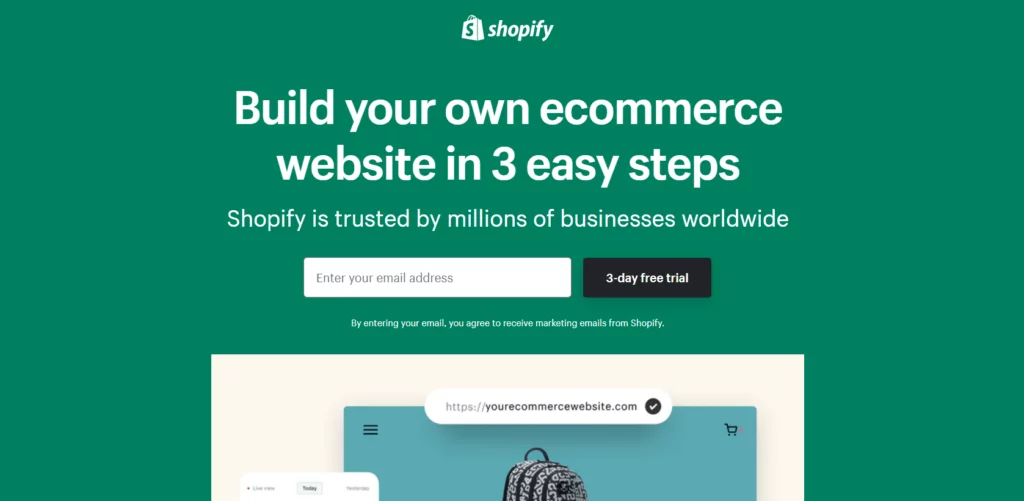
Shopify is without a doubt the best software-as-a-service (SaaS) platform for e-commerce. You can sell directly through your website, at your retail location, on social media, in third-party marketplaces, and everywhere else thanks to our robust platform’s supplementary tools and dropshipping features. For a quick and simple store launch, choose from over 100 paid and free themes.
Additionally, Shopify oversees every aspect of your business; using our top-notch toolkit, you can establish a complete business command center.
Shopify offers free email marketing, abandoned cart recovery, search engine optimization, and additional native tools for business owners.
These helpful features enable you to launch your business with little financial outlay and technical know-how, grow it into a global online brand without switching platforms, and eventually go public.
Pros:
- Easy onboarding process
- Quick start
- Customizable themes
- Quick load times
- Community support
- Excellent built-in marketing tools
- Access to more than 6,000 apps through the Shopify App Store
- Great SEO right out of the box
- Simple to get a custom domain
Cons:
- Shopify Payments is only available in certain nations.
Price:
- Basic Shopify costs $29.99 per month
- Shopify for $79 per month
- Advanced Shopify costs $299 per month
If you pay in full, you receive a 10% annual and 20% biannual discount.
Customer support options:
- Callback
- Community forum
- Phone support provided in 19 languages
- Email support
- Content support
Integrated sales channels:
Mobile app features:
- Suite of mobile tools to fully manage your online business.
Point-of-sale: Yes
Wix
Ideal for independent vendors

Wix is an easy-to-use drag-and-drop website builder offering a registrar of domain names, web hosting, and templates which can be customized. A simple website can be created for no cost, but Wix’s ecommerce features require a paid plan, which you must upgrade to.
Wix has a few useful tools for ecommerce functionality. The platform enables retailers to manage orders, take online payments, market goods through various channels, and launch abandoned cart campaigns. However, it needs a few essential components, especially for product-based businesses.
Low-stock alerts and other essential inventory management features should be present, which constitutes a drawback. You will need a platform with more advanced inventory-tracking tools if you have more than ten products. Third-party apps are also required for social commerce integrations.
Pros:
- Fully hosted
- simple to use
- free for life
- A lot of assistance
Cons:
- Tracking and analytics demand a paid subscription
- No transferability of the site
- Free plan forces Wi branding
Price:
- Business Basic: $23/month
- Business Unlimited: $27/month
- Business VIP: $49/month.
Customer support options:
- Callback service is available 24/7
Integrated sales channels:
- Facebook and Instagram require the third-party app Ecwid
Mobile app features:
The ability to manage your website, though it lacks critical business tools like inventory management, requires a separate app to use mobile POS.
Point-of-sale: Yes
3. BigCommerce
Best for large businesses
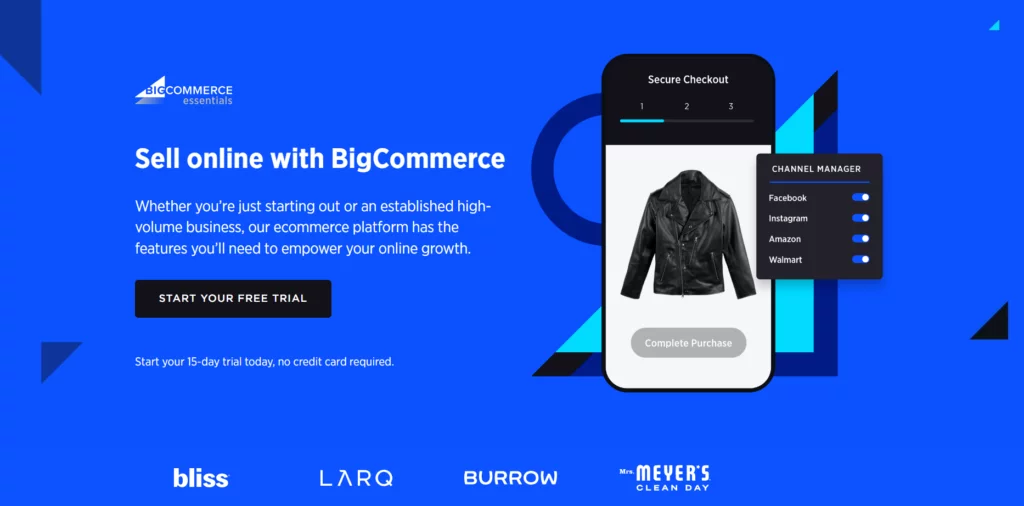
BigCommerce provides a robust website builder that lets you modify every aspect of your online store to fit your vision. You can choose from various paid themes priced between $150 and $400 on the platform, in addition to 12 free themes.
Even though they are excellent, their price is high. The platform allows you to modify the HTML and CSS, even though it is intended for users with little experience in web design.
It provides a complete eCommerce CMS solution enabling you to easily add and edit products or even build a blog to go with your store. The BigCommerce platform makes buying and registering a domain name simple, which is nice and helpful.
Another noteworthy eCommerce feature is the ability to sync your inventory with marketplaces like Facebook, Amazon, and eBay.
BigCommerce integrates with online payment processors like PayPal, Stripe, and Amazon to accept payments. As an alternative, store owners can configure their eCommerce websites to accept payments by check or bank transfer.
Overall, BigCommerce allows you to create fully detailed listings on the back end while giving customers more control to find exactly what they’re looking for on the front end. Because of this, the platform is an excellent choice for large businesses hoping to grow quickly without sacrificing performance.
Pros:
- Fully hosted
- Complete business management skills
- A variety of fee-free payment options
Cons:
- Lack of a native point-of-sale system
- High theme prices
- Unfriendly design options.
Price:
- Standard: $29.95/month
- Plus: $79.95/month, or $71.95/month when paid annually
- Pro: $299.95/month, or $269.96/month when paid annually
- Enterprise custom pricing
Customer support options:
- 24/7 technical support via phone, email, or chat
Integrated sales channels:
- Google Shopping
- Price comparison engines
- eBay
- Amazon
- Walmart
- Etsy
Mobile app features:
- View analytics
- Update orders
- Manage inventory and products
- Search for customers; some features are Android-only
Point-of-sale: Yes
Magento
Best for companies with experience using PHP programming
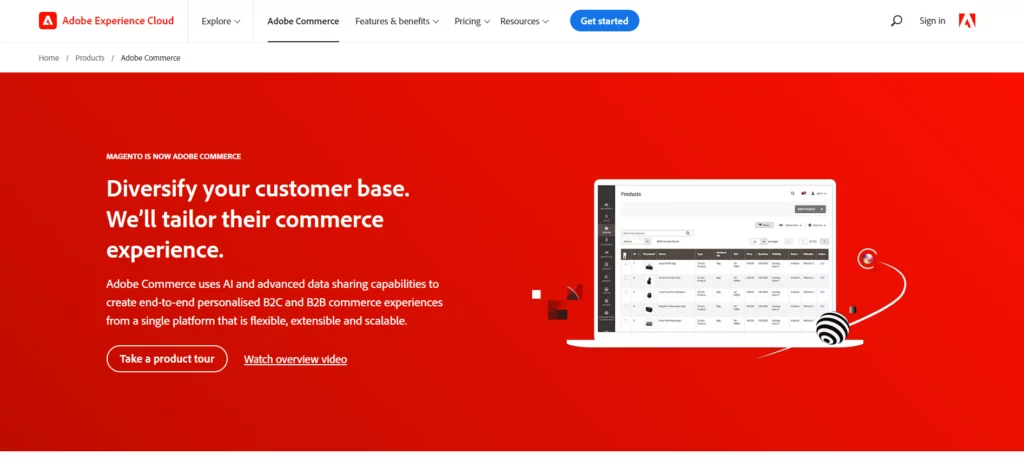
A robust, adaptable system they can customize is something developers find in Magento, a non-hosted eCommerce platform, want. And while this presents many advantages for brands seeking wholly customized platforms, it also comes with a great deal of complexity and expense.
You need highly advanced coding and development skills to create and maintain the entire infrastructure. Therefore, there might be better ecommerce platforms than Magento if going global is on your agenda.
Pros:
- Free to start
- Hosted
- Easily accessible developers for customization
Cons:
- Needs technical know-how
- Is not natively SEO-friendly
- May seem challenging to non-technical users
Price:
- Custom pricing only
Customer support options:
- Available phone support
- Online help center
- Technical support resources
Integrated sales channels:
Amazon
Mobile app features: n/a
Point-of-sale: Third-party extensions available
5. WooCommerce
For WordPress users only
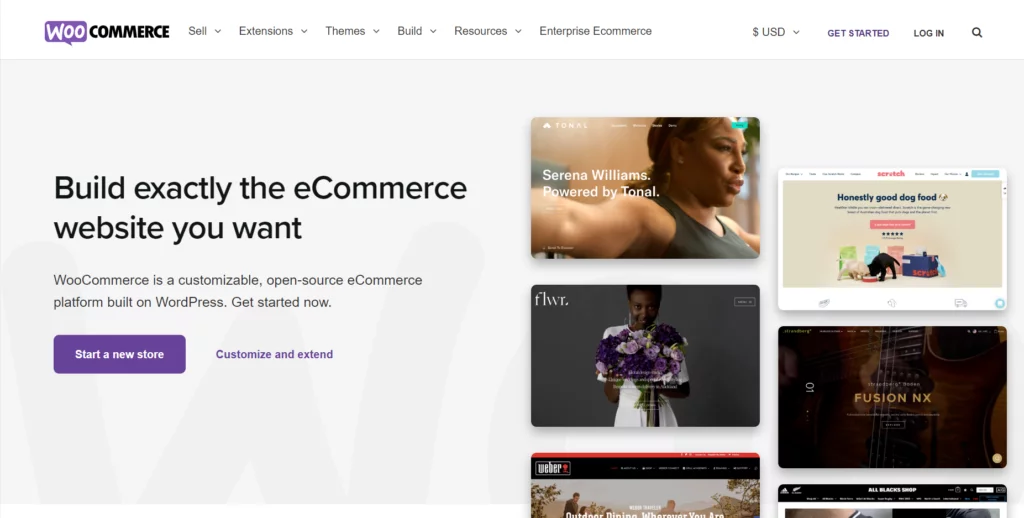
WooCommerce is particularly well-known to those familiar with WordPress because it is an addition to the famous blogging platform. WooCommerce is WordPress’ response to those looking to conduct online business because WordPress is typically used for content-driven websites rather than e-commerce.
Many of WordPress’ selling features are essential or dependent on adding apps because it is primarily a content management system (CMS) and then an ecommerce platform.
Additionally, even though you can add a ton of apps and plug-ins to your store, the more you use them, the more likely it is that you’ll break something. And given the lack of available support, this is only sometimes a risk worth taking.
Overall, WooCommerce’s fragility and unreliability make creating and maintaining an online store challenging. Additionally, since it’s not hosted, managing your website hosting will be an additional task and expense for you. Additionally, it is not PCI compliant, putting your company at risk when processing payments.
Pros:
- Over 6,000 WordPress plug-ins and integrations
- Open source
- Excellent choice for WordPress users
- Active developer and expert community
Cons:
- Self-hosted
- WordPress proficiency required
- High costs associated with hosting, development, maintenance, and other expenses
Price:
- $30 as average monthly fee
- $120/year for hosting
- $15/year for domain name registration
- $100/year for site theme
- $108/year for shipping
- 2.9% plus $0.30 per sale
- $348/year for marketing and communications
- $79/year for SEO
- $65/year for SSL certificate
Customer support options:
- Live chat or email
- No support is offered for third-party apps and plug-ins
Integrated sales channels:
- Google Shopping
- Etsy
- eBay
- Amazon
- Walmart
Mobile app features:
- Add products
- Manage orders
- View analytics
Point-of-sale: Native POS available
Prestashop
The best open-source eCommerce platform
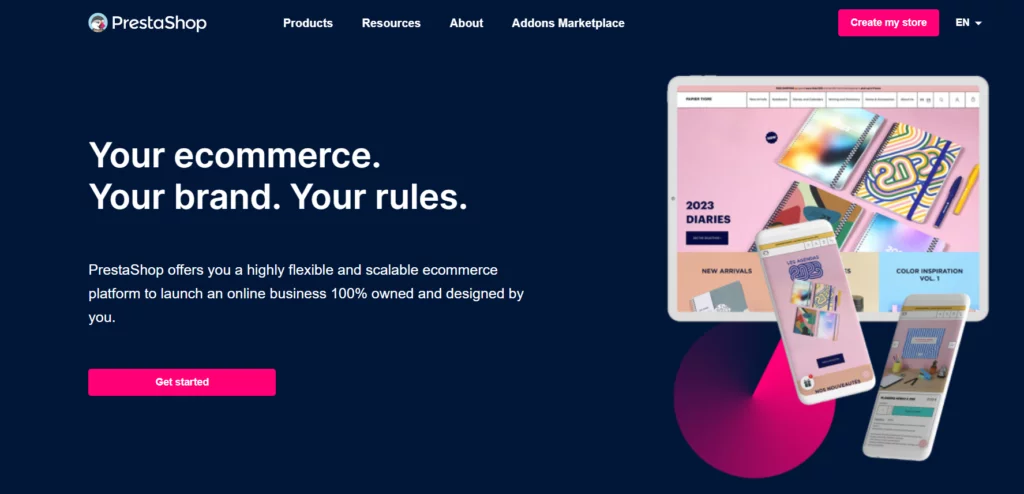
PrestaShop is a reasonably priced open-source ecommerce platform that works well for new companies with a background in technology.
Because there isn’t any built-in customer support and integrations are only sometimes successful, PrestaShop users often troubleshoot issues independently with the community’s assistance.
Inventory management, an online shopping cart, international sales, and analytics reporting are examples of business tools and features. On your PrestaShop site, you also have much control over the privacy and security settings.
Overall, third-party hosting, the abundance of untested add-ons and modules, and the complex setup can make maintaining your PrestaShop e-commerce site easier. Check out most trending PrestaShop themes here.
Pros:
- Global selling through payment option plug-ins
- Free and open source
- Simple to use
Cons:
- Limited scalability
- Poor web design
- Absence of an official support team
Price:
Free
Customer support options:
- Technical support is available through paid support plans.
- Support is provided via phone.
- Help center, technical documentation, and community forum are available online.
Integrated sales channels:
- Amazon
- eBay
- Etsy
Mobile app features: n/a
Point-of-sale: Available as add-on modules
Squarespace
Best for premium templates

Squarespace is the following website builder with an ecommerce platform choice. Similar to Wix, Squarespace uses drag-and-drop technology, which is simple to use.
Both platforms need to be significantly modified to add ecommerce functionality because they are primarily used to build websites rather than as online selling platforms.
If you want to sell products online, Squarespace needs to be set up, and there are only two payment integrations—Stripe and PayPal.
You could even outsource it if you have the money. After you’ve configured the e-commerce feature, Squarespace has functional inventory management tools. Higher-tiered plans also allow you to sell subscription-based goods or gift cards.
You can easily add the Shopify Buy Button to your website if you want to avoid the hassle of setting up an online store on the back end in Squarespace.
You can add unlimited products, use over 100 payment gateways compatible with secure checkout, monitor sales, and growth trends, easily integrate orders and shipping, and get support for international tax and currency.
Pros:
- Professionally designed templates
- No transaction fees
- Hosted, so no concerns about upkeep and server costs
Cons:
- Limited multichannel sales
- Limited focus on e-commerce
- No phone support
- Difficult to override themes CSS and HTML
Price:
- Personal: $16/month, or $12/month when paid annually
- Business: $26/month, or $18/month when paid annually
- Basic Commerce: $30/month, or $26/month when paid annually
- Advanced Commerce: $46/month, or $40/month when paid annually
- Enterprise pricing also available
Customer support options:
- Email available 24/7
- Live chat available Monday through Friday, 4 a.m. to 8 p.m. ET.
Integrated sales channels:
Mobile app features:
- Website editing
- Shipping label scanning
- Order management
- Inventory management
- Customer communication
Point-Of-Sale: Available via mobile app
Conclusion
As the eCommerce landscape continues to evolve, staying informed about the latest ecommerce platforms and their offerings will empower you to make the best decision for your business. By selecting a platform that aligns with your goals and growth plans, you can enhance your online presence, improve customer experiences, and drive sustainable growth.
FAQ
What ecommerce platform categories are there?
Ecommerce business setups can be categorized and given different names in various ways.
However, there is widespread agreement that B2B (Business to Business), B2C (Business to Consumer), B2G (Business to Government), C2C (Consumer To Consumer), C2B (Consumer to Business), and B2B2C are among the business types that exist (Business to Business to Consumer). New terms have also been developed for social and m-commerce (eCommerce through social media).
What qualities do customers seek in an ecommerce platform?
People search for common features in eCommerce platforms across all demographic groups, genres, statuses, and income levels. They want simple functionality, such as responsiveness, speed, smooth navigation, and mobile optimization.
Users also want in-depth information about goods and services; they need more content with summaries. They desire accurate information, concise, quickly loading images, and an efficient on-site search. Continually update your ratings and reviews section to increase credibility.



